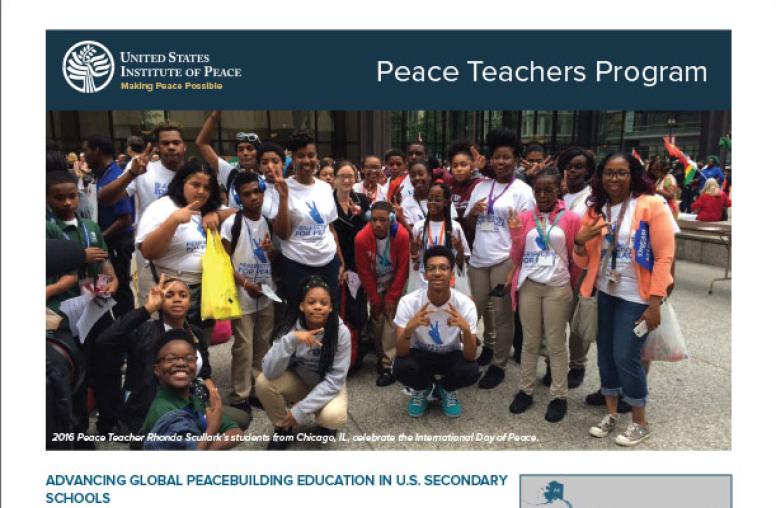USIP’s Lawrence Woocher on the New Steps to Prevent Genocide
USIP’s Lawrence Woocher discusses President Barack Obama’s major announcement Thursday on new steps to prevent mass atrocities, including the creation of an interagency Atrocities Prevention Board and other initiatives.

What will the interagency Atrocities Prevention Board do? What role will it play in policymaking?
The White House announcement states that the new board will “coordinate a whole-of-government approach to engaging ‘early, proactively, and decisively’” in situations at risk of mass atrocities. It remains to be seen how it will operate in practice, but one important role indicated in the White House announcement would be to link risk assessments with the development of interagency preventive strategies. No systematic process currently exists to fill this critical function. As a result, despite the benefits of preventive action, a reactive culture prevails. For example, it is difficult to attract high-level policy attention on a situation like Cote d’Ivoire in advance of a crisis, even when analysts identified significant risks related to the presidential elections. Therefore, a more systematic and coordinated interagency approach should ensure that a fuller range of options are presented to senior decision-makers before crises become full blown.
Another issue to watch is how the interagency Atrocity Prevention Board will relate to existing interagency structures—principally, the National Security Council and its Deputies Committee. New mechanisms designed for specialized problems are always at risk of being marginalized and can inspire debates over which is the most appropriate venue for managing a particular situation. To succeed, the new Atrocity Prevention Board—which follows from the Genocide Prevention Task Force’s recommendation to create a dedicated, high-level interagency committee—will need to establish itself as a mainstream policy development forum, not a place for special projects.
What are some implications of President Obama’s announcement to bar entry people who “organize or participate in war crimes, crimes against humanity, and serious violations of human rights”?
Most directly, this proclamation will help ensure that the United States cannot be used as a haven for perpetrators of these heinous crimes since suspected perpetrators will be denied entry. The White House further argues that the action amounts to “a new tool to deter would-be organizers of atrocities, serious human rights violations, and related abuses.” But that presumes that potential perpetrators might want to travel to the States and that foreclosing this possibility would be perceived by them as a significant penalty. I doubt that this would be a significant factor for many, if any, would-be perpetrators.
Why is this being announced now? Any significance to the timing?
This initiative has been in the works for some months. Its timing is probably less the result of any specific world events than patient spade work behind the scenes combining with an opening in the president’s schedule. Nevertheless, this administration has been confronted with numerous potential or manifest mass atrocity crises—e.g., in Cote d’Ivoire, Kyrgyzstan, Libya, Sri Lanka, Sudan and Syria. Each in its own way, these situations all underscore the serious and continuing challenge that the U.S. government faces in mobilizing effective strategies to prevent large-scale and systematic attacks on civilians.
Are we “limited to either sending in the military or standing by and doing nothing” in the face of mass atrocity – or when we are on the brink of mass atrocity? That is, based on USIP research, what other tools exist that are less costly and effective?
Relevant preventive tools begin with risk assessment, early warning and other kinds of analysis; include long-term development initiatives such as support for inclusive governance institutions and the rule of law; diplomatic tools such as fact finding, sanctions and mediation; and military measures short of the use of force, such as peacekeeping, information operations and intensive surveillance. The challenges for the new Atrocity Prevention Board will be two-fold: (1) to make these largely latent capabilities readily usable on short notice, and, (2) to select the most effective combination of preventive measures when faced with inherently complex and uncertain situations
How does this White House initiative complement the work and findings of the Genocide Prevention Task Force (GPTF)?
In issuing a Presidential Directive on Mass Atrocities and creating a new interagency Atrocities Prevention Board, President Obama has followed two of the GPTF’s central recommendations.
President Obama’s unambiguous statement that “Preventing mass atrocities and genocide is a core national security interest and a core moral responsibility of the United States of America” is precisely the kind of clarity that the Task Force recommended.
There are several other themes in the presidential directive that echo findings of the GPTF and ongoing work by the Institute, including the need to improve the use of intelligence and early warning assessments to support policy development, to conduct “an inventory of existing tools and authorities across the government that can be drawn upon to prevent atrocities,” and to improve training for frontline practitioners of diplomacy, development and defense.
Finally, why is prevention a global responsibility? How can the U.S. engage key regional allies, as the president’s directive requests?
The United States is just one of 140 states that has a legal obligation to “undertake to prevent” genocide, based on its ratification of the 1948 Convention on the Prevention and Punishment of the Crime of Genocide. Furthermore, at the 2005 World Summit, all member states of the United Nations accepted the “responsibility to protect populations from genocide, war crimes, ethnic cleansing and crimes against humanity”—a concept known as “R2P.”
The consensus that preventing mass atrocities is a global responsibility, however, belies the difficulty of forging effective international cooperation in specific cases. For example, despite the continued assaults by the Syrian government on civilian protesters over the last several weeks, only yesterday was the U.N. Security Council able to agree on a non-binding statement condemning and calling for an end to the violence. The Council remains divided on whether to adopt measures that could more directly change the course of events.



